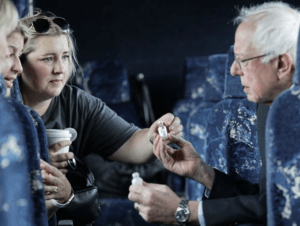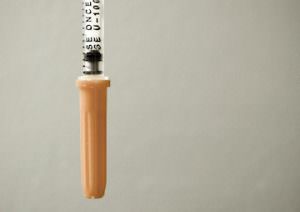Skyrocketing Drug Prices Have Americans Taking Desperate Measures
“It felt like we were robbing the pharmacy,” one buyer says of the low prices she paid in Canada. Insulin packages. (Rodrigo Abd / AP)
Insulin packages. (Rodrigo Abd / AP)
With the rising cost of health insurance premiums and prescription drugs, Americans are scrambling for ways to cover lifesaving care. Injuries and illness, whether due to freak accidents or as chronic issues, often come “at a staggeringly high financial cost,” writes Jeffrey Young in HuffPost.
Sometimes this means Americans resort to crowdfunding their medical care. As Young explains, “more than 50 million donors contributed more than $5 billion to GoFundMe campaigns between 2010 and 2017.” For the 7.5 million Americans with diabetes who rely on insulin to survive, it might mean international travel. As Emily Rauhala reports in The Washington Post, Americans who can’t afford insulin here are making trips to Canada.
“It felt like we were robbing the pharmacy,” said Quinn Nystrom, a Type-1 diabetic who joined a caravan driving from Minnesota to Fort Frances, Ontario. There, she paid $1,200 for a supply of insulin that would have cost $12,000 at home.
The price of insulin has risen considerably from when Nystrom was diagnosed with diabetes as a child in the late 1990s. She told the Post that “her family paid about $15 to $20 a vial. Now, at 33, she sometimes pays more than $300 for the same amount.”
As reported by USA Today, a March Senate Finance Committee hearing revealed that “the price for one vial of Eli Lilly’s Humalog surged from $35 in 2001 to $234 in 2015. From 2013 to this year, Novo Nordisk’s Novolog jumped from $289 to $540 and Sanofi’s Lantus from $244 to $431, according to a committee letter.”
Part of what causes insulin’s high prices, and people’s desperation to drive to Canada to obtain it, is that “insulin is not an optional medication,” says Simeon Taylor, a University of Maryland School of Medicine diabetes researcher. “People have to buy insulin no matter what the cost is. That gives a lot of strength to the people selling insulin.”
Rauhala notes the practice of buying drugs in Canada is not recommended by U.S. officials and in fact, “some of it might be illegal under Food and Drug Administration guidelines.” But, as organizers of the caravan (who use that word as a reference to migrants traveling to the U.S. border) told Rauhala, they’re aiming to raise awareness of their plight.
“When you have a bad health-care system, it makes good people feel like outlaws,” Lija Greenseid, who led the caravan and has a 13-year-old daughter with Type 1 diabetes, told the Post. She added, “It’s demeaning. It’s demoralizing. It’s unjust.”
Federal and state legislatures are aware of the practice, and Democrats and Republicans alike are proposing bills that would allow importing multiple prescription drugs from Canada. Canadian experts are divided on the idea. Steve Morgan, a Canadian health economist who has advised his government on health policy, told Politico in February that “the Canadian shelves would run dry,” if such bills were passed.
By contrast, Barry Power, director of therapeutic content with the Canadian Pharmacists Association, told the Post that he hasn’t seen impacts on Canadian insulin supplies. The exact number of people who are traveling to Canada to buy insulin or other prescription drugs is unknown, although it’s enough of a trend for the Canadian Pharmacists Association to track it.
Power also said that in Canada, drug prices are kept low through national policy, which involves price caps and negotiations with drug companies, which, he told the Post, “is something the U.S. could do.”
Meanwhile, the Minnesota caravan heads out to Canada again next month. Interest has grown so much, the Post notes, that they’re switching from cars to a bus.
Your support matters…Independent journalism is under threat and overshadowed by heavily funded mainstream media.
You can help level the playing field. Become a member.
Your tax-deductible contribution keeps us digging beneath the headlines to give you thought-provoking, investigative reporting and analysis that unearths what's really happening- without compromise.
Give today to support our courageous, independent journalists.






You need to be a supporter to comment.
There are currently no responses to this article.
Be the first to respond.